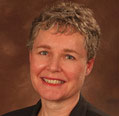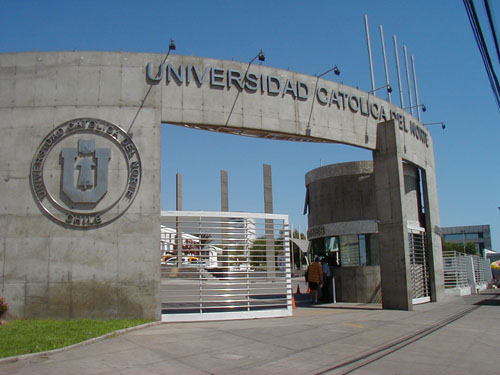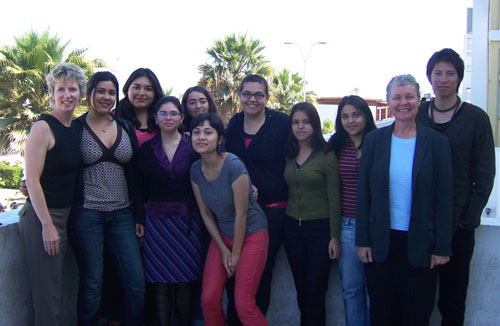
![]()
On the Job
 |
| Catherine Thomas |
Name: Catherine M. Thomas
Number of years in the field:
In 2000, I began studying for my TESOL M.A. at Teachers College, while I was a full-time librarian at Columbia University. I completed the degree in 2002.
First job in the field:
In 2002, I began as a teacher at Bronx Community College. I taught ESL to adults enrolled in a government-funded program. Many of my students were single mothers from the Dominican Republic.
How did you get into the field?
In 1981, I earned an M.S. degree in Library & Information Science. After working in university libraries for many years, I decided to make a career transition to TESOL. The skills I honed as a librarian provided me with a solid foundation for the skills I now utilize as a TESOL professional.
Current job position:
English Language Fellow, September 2008-June 2009.
Current place of employment:
I provide teacher training and language teaching services to two host institutions: the Instituto Chileno Norteamericano and the Universidad Católica del Norte.

Universidad Católica del Norte, Antofagasta, Chile
Why did you become an English Language Fellow?
I had four goals in mind:
- learn how to train EFL teachers
- experience the differences between teaching EFL (in Chile) and teaching ESL (in New York City)
- see how it would feel to live outside the U.S. for an extended period of time
- improve my Spanish
What did you have to do to become an English Language Fellow?
I assembled an online application using a secure Web site hosted by Georgetown University. After my application was complete, I participated in two telephone interviews. Just before my fellowship began, I went to Washington, D.C. for a week-long orientation session with all the other fellows.
Who are your students, and what courses do you teach?
I have three categories of students:
1. Pre-service teachers. I teach two university courses: Current Issues in the ELT Profession, and Materials and Resources for ELT.
2. In-service teachers. I facilitate workshops on topics such as Authentic Assessment; Classroom Management; Multilevel Classes; Well-Balanced Lesson Plans; PowerPoint; Reading and Writing with Blogs and MiniBlogs; Teaching Academic and Business Writing; Using Digital Images in the English Language Classroom; Virtual Immersion Programs in EFL Environments; Web Resources for English Language Teaching and Learning.
3. Adults and Teenagers. I teach a conversation course for adults, and I host a Conversation Club for high school students.

What is your day like?
A typical day involves an enormous amount of preparation, but only 2-3 hours of contact time with students. The preparation is intense because I am developing new skills: how to train teachers and how to teach EFL (as opposed to ESL). I work pretty much all the time. Frankly, there isn’t much else to do in Antofagasta, Chile.
What do you like about the students?
Most of my students have never visited an English speaking country and have had little contact with native English speakers. They seem genuinely delighted by the novelty of interacting with a native English speaker.
What has been the biggest surprise so far?
My information technology skills have been a surprising asset. I create and maintain Web pages, PowerPoint presentations, and course Web sites, and I offer technology-related workshops and consulting services. For example, I was asked to develop a proposal for building a Virtual Immersion Program (VIP) at the university. The VIP exploits information technology to compensate for Chile’s lack of an English language environment; it encourages students to use CD-ROM and Web-based multimedia courses, microblogging, electronic pen pals, online chat, Web resources such as texts, images, songs, audio, and video, and a variety of Web sites designed for English language learners.
What Web sites have you found to be useful?
I have compiled my favorite TESOL links here:
http://www.columbia.edu/~thomas/tesol/
What are the challenges you face?
Being an English Language Fellow is like being a freelance consultant. You present yourself as someone who is knowledgeable about language teaching approaches, issues, materials, methods, principles, and resources. You are often developing your expertise on the fly through extensive research and analysis. You assess the needs of your host institutions, and you look for ways to leave a lasting and sustainable legacy.
How has this fellowship affected you professionally and/or personally?
It has been a wonderful professional development opportunity. I feel more self-confident and well-rounded both personally and professionally.
Would you recommend becoming an English Language Fellow?
If you happen to be at a point in your life where it is possible for you to be away from your home for ten months, I would enthusiastically recommend the fellowship as a richly rewarding experience.
More Information about the English Language Fellow Program:
The English Language Fellow Program is funded and sponsored by the U.S. Department of State and administered by Georgetown University.
English Language Fellow Program
http://elf.georgetown.edu/
U.S. Dept. of State Office of English Language Programs
http://exchanges.state.gov/englishteaching/
